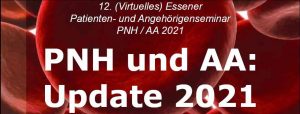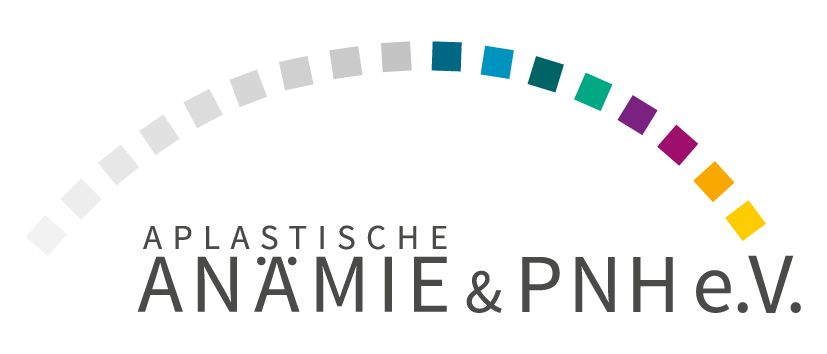12th Essen PNH/AA Seminar – Summary

The12th Essen patient and family seminar PNH / AA 2021 took place for the first time in a virtual and shortened form due to the ongoing corona pandemic.
More than 80 participants had dialled in and first listened to the brief welcome by Prof. Dr. Christian Reinhardt, the new Director of the Clinic for Haematology and Stem Cell Transplantation at Essen University Hospital. Afterwards, Prof Dr Alexander Röth, head of non-malignant haematology and coagulation at the University Hospital Essen and organiser of the seminar, presented the update on aplastic anaemia (AA) and PNH, which was divided into 4 sections:
1 Bone marrow and symptoms
In the bone marrow, different types of stem cells are usually produced from stem cells before they migrate into the blood vessels. Disorders of the bone marrow can lead to diseases such as AA and PNH. In AA, certain defence cells attack the stem cells in the bone marrow and blood production is affected to varying degrees, depending on the severity of the disease. As a result, there are more fat cells and fewer stem cells in the bone marrow. Bone marrow disorders can lead to diseases such as AA and PNH. In AA, certain immune cells attack the stem cells in the bone marrow and blood production is impaired to varying degrees, depending on the severity of the disease. As a result, there are more fat cells and fewer stem cells in the bone marrow.
Symptoms of a AA can include
– Bleeding tendency (thrombocytopenia): bleeding in various places when the number of blood platelets (thrombocytes) is reduced
– Anaemia: paleness, fatigue, shortness of breath, headaches, ringing in the ears, palpitations and chest pain due to a lack of oxygen caused by a reduced number of red blood cells (erythrocytes).
– Deficiency of the immune system (neutropenia): Infections of various kinds, e.g. gingivitis, fever, pneumonia with a reduced number of white blood cells (leukocytes).
It is important to diagnose the disease at an early stage and – if necessary – to initiate therapy.
In PNH , on the other hand, the stem cells function, but some of them are genetically altered and pass on their disorder to the blood cells. Therefore, the following symptoms symptoms may be present: Therefore the following symptoms may be present:
– Destruction of the red blood cells (haemolytic anaemia): possible consequences include anaemia/fatigue, dark urine, abdominal pain, difficulty swallowing, shortness of breath.
– Blood clot formation (thrombophilia): at various, even atypical sites in the body, e.g. liver
– Bone marrow failure (cytopenia): varies in severity, often precedes PNH. 2 Treatment of AA
2 Treatment of AA
The treatment options for AA are basically either suppression of the immune system (immunosuppression) or der stem cell transplantation. Immunosuppression consists of a combination of drugs: ATG, prednisolone and ciclosporin. ATG stands for antithymocyte globulin and is an antibody obtained using animal cells, preferably from horses (“horse ATG”, ATGAM®). Prednisolone is a cortisone preparation and is given concomitantly for 4 weeks to reduce adverse reactions. Ciclosporin (Sandimmun®), like ATG, suppresses the immune system and is usually given for at least 12 months. The aim of this treatment is to suppress the cells that attack the bone marrow so that it can recover and start producing blood again. mmunosuppression comprises the combination of medicines: ATG, prednisolone and ciclosporin. ATG means antithymocyte globulin which is an antibody made with the help from animal cells, preferably horse („equine ATG“, ATGAM®). Prednisolone is a cortisone prepapration and is administered for 4 weeks to suppress side effectcs. As ATG, ciclosporin (Sandimmun®) suppresses the immune system and must usually be taken for at least 12 months. The aim of this treatment ist tosuppress those cells that attack the bone marrow in order that the bone marrow can recover and restart to produce blood. Response rates are around 80% in combination therapy and it usually takes 3-6 months to show an effect.
For some years now, the drug Eltrombopag (Revolade®) has also been used in second-line therapy, i.e. when the first treatment has not helped or is no longer effective. It stimulates the production of platelets, but in AA it can also stimulate the other types of blood cells. In a study (“RACE”), the efficacy of eltrombopag was shown together with ATG and ciclosporin in first-line therapy. This study could not be carried out in Germany due to the lack of drug approval. It stimulates the development of platelets but may also of stimulate other types of cells. In a clinical trial („RACE“) the efficiacy of eltrombopag in combination with ATG and ciclosporin infirst-line therapy was shown. In Germany it was not possible to take part in the trial because of missing drug marketing authorisation.
Prof Dr Röth summarised the AA part of his presentation by pointing out that
– the prognosis of AA is very good today
– It is important to diagnose the disease early and to treat it in a specialised centre according to the guidelines.
– equine (horse) ATG is the standard in firt-line treatment (currently a declaration of cost coverage must be obtained from the health insurance fund prior to therapy; approval is expected in autumn 2021)
– Eltrombopag can further improve the results of first-line treatment.
3 Treatment of PNH
PNH cells lack certain molecules on their surface due to the aforementioned genetic modification . They are therefore defencelessly exposed to attacks by a part of the immune system, the complement system, then intravascular haemolysis occurs. In this process, the red blood cells are prematurely broken down within the blood vessels. In 2007, the first PNH-specific drug was approved in the EU, the antibody Eculizumab (Soliris®). It is given as an infusion every fortnight and suppresses the immune system at a specific site (C5); it is called a C5 complement inhibitor. This drug has significantly improved the prognosis of PNH, but up to 80% of patients treated with it have retained their anaemia. One reason for this is that the complement system can continue to destroy the blood cells through other pathways, leading to extravascular haemolysis and the breakdown of red blood cells in the spleen and liver. In 2019, the further development of eculizumab, the drug ravulizumab (Ultomiris®) was approved in the EU, which is only given as an infusion every 8 +/- 1 weeks and is just as effective as eculizumab. With both drugs, it is important that the patients receive a meningococcal vaccination, which must be refreshed every 3 years. They are therefore defencelessly exposed to attacks by a part of the immune system, the complement system, then destruction of the red blood cells (haemolysis) occurs within the blood vessels (intravascular). In 2007, the first PNH-specific drug was approved in the EU, the antibody eculizumab (Soliris®). It is given as an infusion every fortnight and suppresses the immune system at a specific site (C5), it is called a C5 complement inhibitor. This drug has significantly improved the prognosis of PNH, but up to 80% of patients treated with it retain their anaemia. One reason for this is that the complement system can continue to destroy the blood cells via other pathways, leading to extravascular haemolysis and the breakdown of red blood cells in the spleen and liver. In 2019, the further development of eculizumab, the drug ravulizumab (Ultomiris®) was approved in the EU, which is only given as an infusion every 8 +/- 1 weeks and is just as effective as eculizumab. With both medicines, it is important that patients receive a meningococcal vaccination, which must be refreshed every 3 years.
In addition, there are a number of other drugs that are currently undergoing clinical trials clinical trials. Prof. Dr. Röth presented 3 preparations of these that have shown an improvement in PNH-relevant values in studies compared to untreated or with one of the previously approved C5 complementin inhibitors: Prof Röth presented 3 preparations of these that have shown an improvement in PNH-relevant values in studies compared to untreated or with one of the previously approved C5 complementin inhibitors:
– Crovalimab (SKY59), also a C5 antibody; the drug is injected under the skin every four weeks and has a different mechanism of action than eculizumab
– Pegcetacoplan (APL-2), a C3 complement inhibitor that is produced synthetically; it is administered 2-3 times a week under the skin with a pump; it has been approved in the USA and is being applied for in the EU
– Iptacopan (LNP023), a factor B blocker; factor B is part of the complement system; the drug is given in the form of capsules 2 times a day.
In summary, Prof Dr Röth explained that
– Ravulizumab is a new standard therapy for PNH that is well tolerated and has a significantly longer infusion interval of 8 +/- 1 weeks compared to eculizumab.
– Individual counselling is required for pregnancies, as there is no published experience with pregnancy under ravulizumab.
– Meningococcal vaccination is mandatory and standby therapy (750 mg ciprofloxacin) must be taken if meningococcal infection is suspected.
– New substances with improved response, different dosage forms and new safety profiles are being tested in clinical trials.
4 Fatigue and SARS-CoV-2 vaccination
In the last part of his lecture, Prof. Dr. Röth talked about the sometimes considerable impairment of quality of life due to fatigue, which can occur in both PNH and AA patients. They often feel tired and exhausted, and sleep cannot or can only partially compensate for this feeling. Prof. Dr. Röth based his statement on an evaluation of the PNH register, which shows fatigue as the most frequently occurring symptom. The PNH register has been collecting various data from PNH patients for many years in order to gain insights into the disease and the effects of previous therapy. They often feel tired and exhausted, and sleep cannot compensate for this feeling, or only partially. Prof Dr Röth based his statement on an evaluation of the PNH register, which shows fatigue as the most frequently occurring symptom. The PNH register has been collecting various data from PNH patients for many years in order to gain insights into the disease and the effects of previous therapy.
Finally, Prof Röth explained that acording to previous experienceexperience with the SARS-CoV-2 (“Corona”) vaccination , AA patients should not vaccinate themselves against SARS-CoV-2 across the board, but should seek individual advice before the Corona vaccination. Those who have already been vaccinated can have their vaccination protection (titer) determined. PNH patients receiving a complement inhibitor have not shown any severe COVID-19 disease progression to date, as far as is known.
Prof Röth concluded his lecture with the final photo of the 11th patient and family seminar, which took place in 2019 in the usual surroundings at the University Hospital Essen, and pointed to the 13th seminar, which is to take place again on 17 September 2022 in the Deichmann Auditorium of the University Hospital Essen.
After a short break, there was a question and answer session lasting almost an hour, during which the participants were able to ask their many questions using a microphone and video or via chat. After Prof. Dr. Röth had answered all the points, he closed the seminar punctually and once again expressed his hope that the seminar will take place in 2022 in the presence of the participants. After Prof Röth had answered all the points, he closed the seminar on time and once again expressed his hope that the 2022 event would be held as a live event.
We thank Prof Röth for the update and his commitment and also hope to see all participants in person at the patient and family seminar in 2022!
Text: Ulrike Göbel

